Entry-Level Database Administrator Resume Examples

Mar 31, 2025
|
12 min read
Ace your entry-level database administrator resume by organizing information to make employers take note. Unlock the key to crafting a solid foundation for your career—it’s all about structured data and making the right queries!
Rated by 348 people
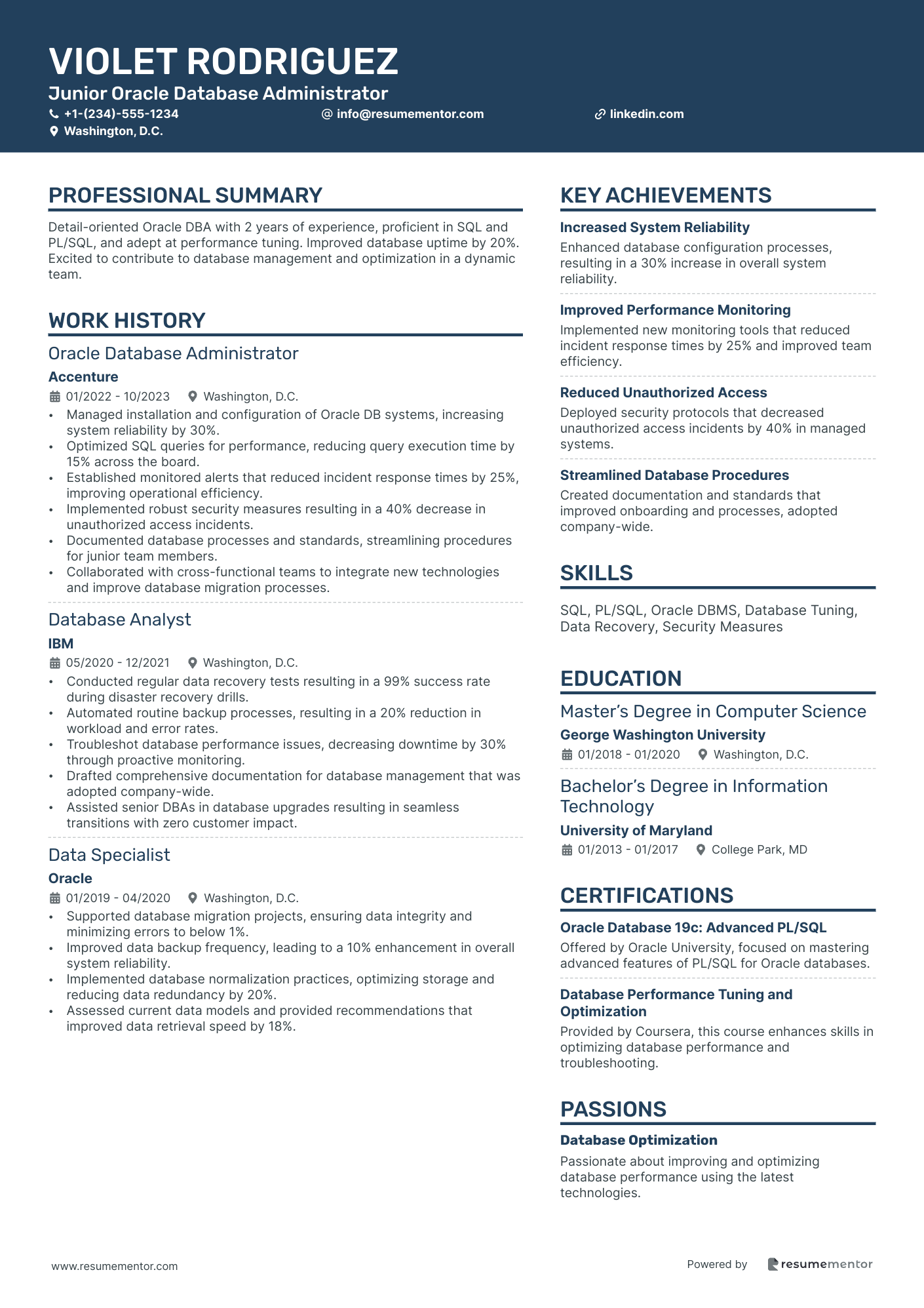
Junior Oracle Database Administrator
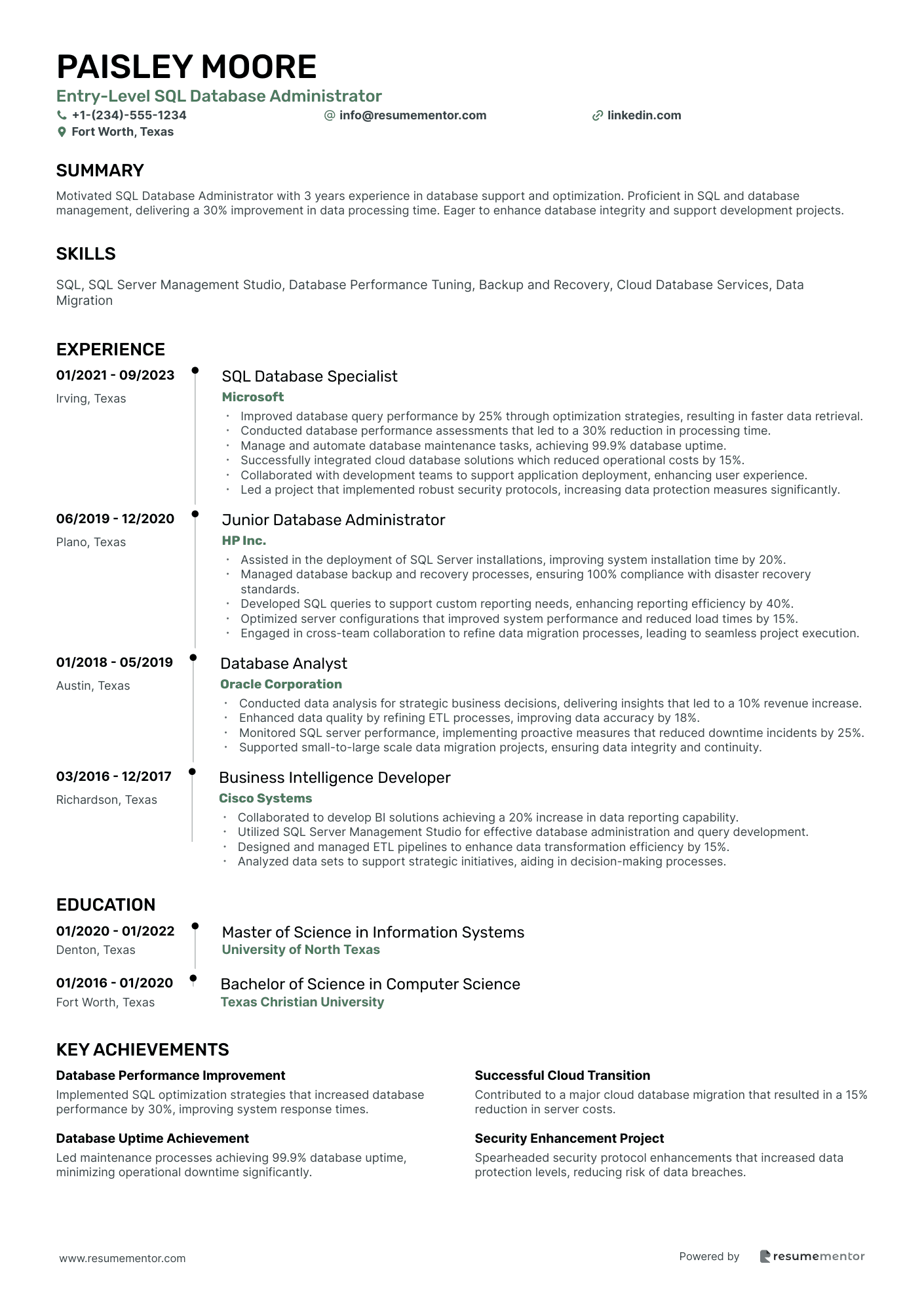
Entry-Level SQL Database Administrator
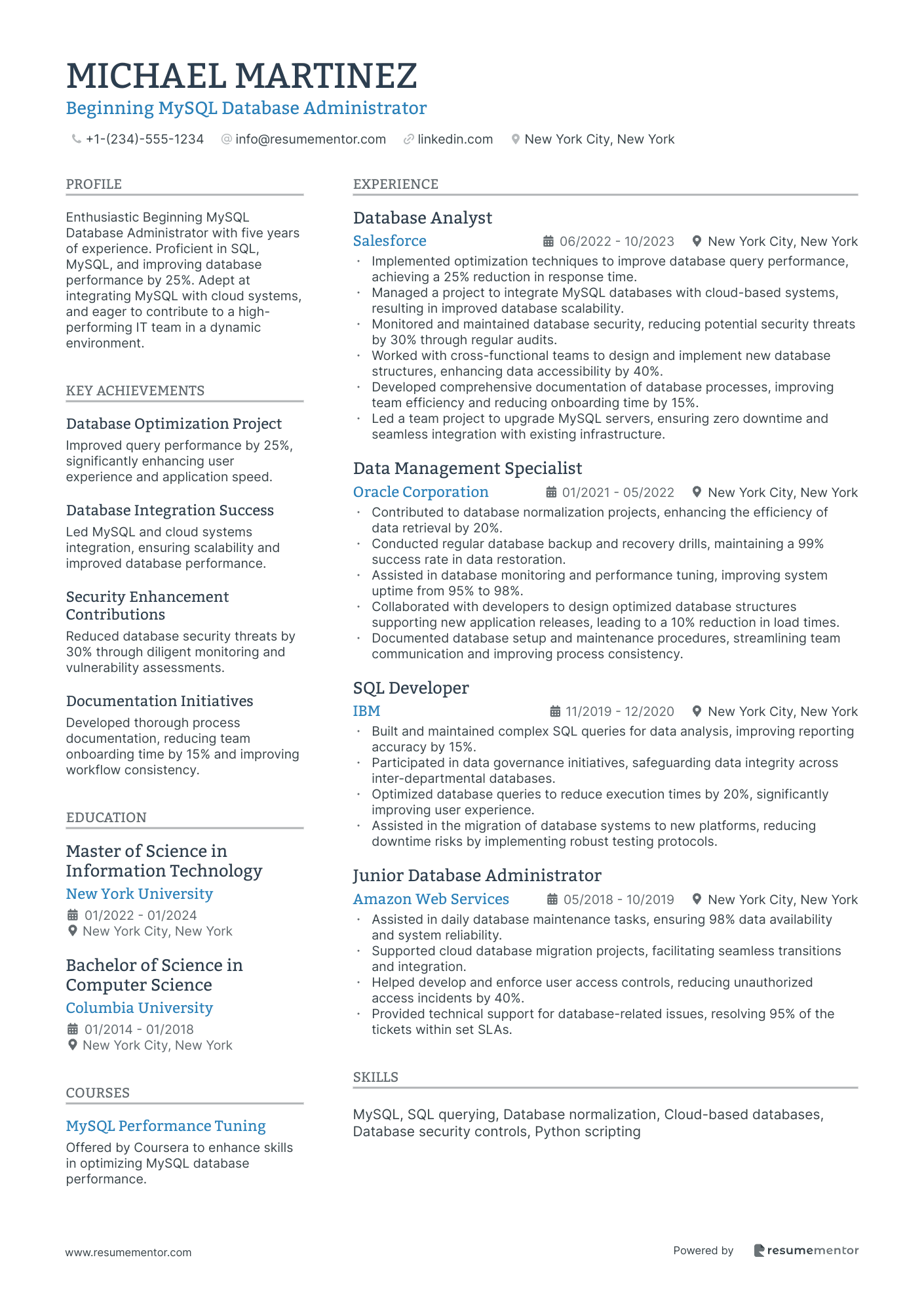
Beginning MySQL Database Administrator
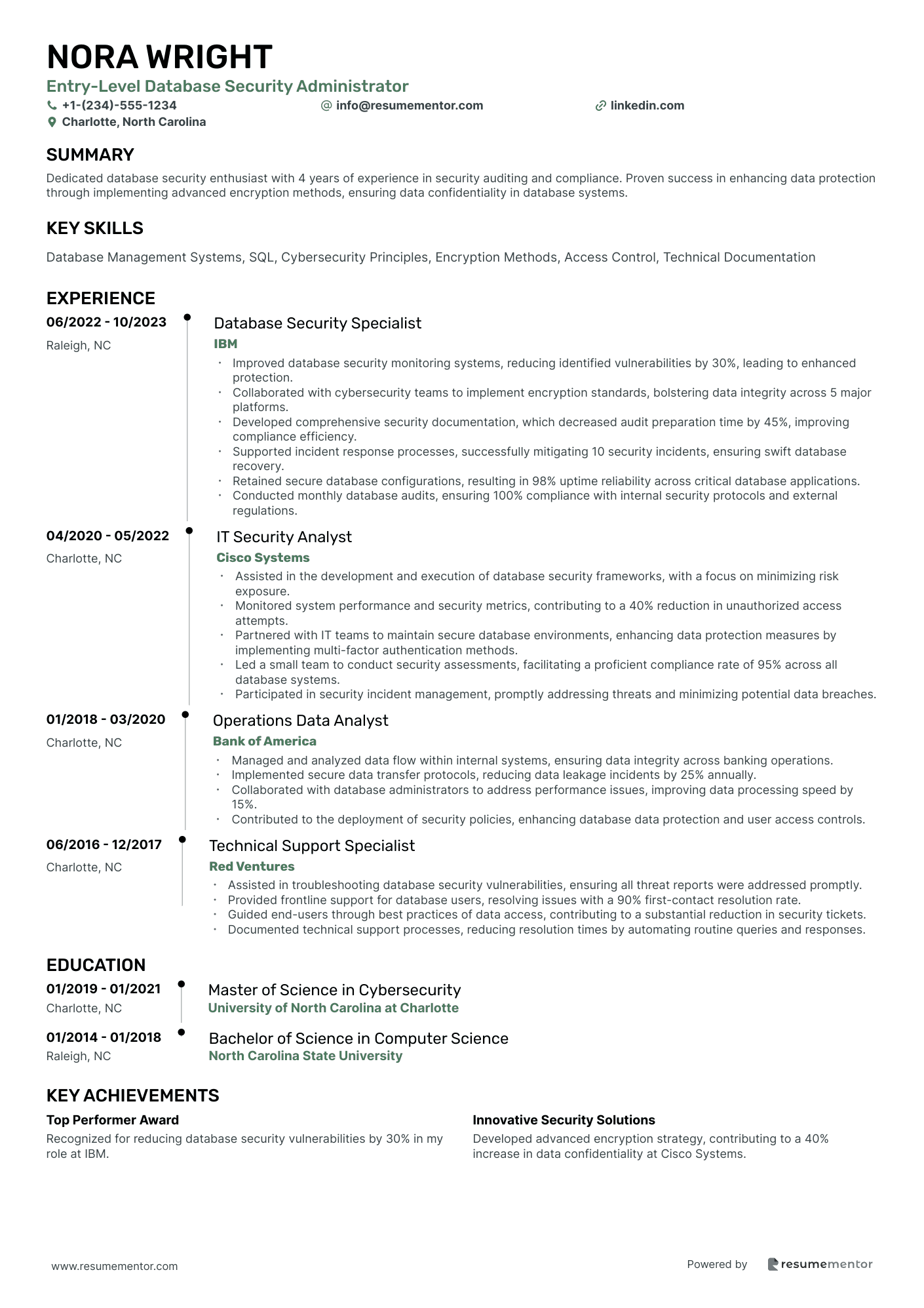
Entry-Level Database Security Administrator
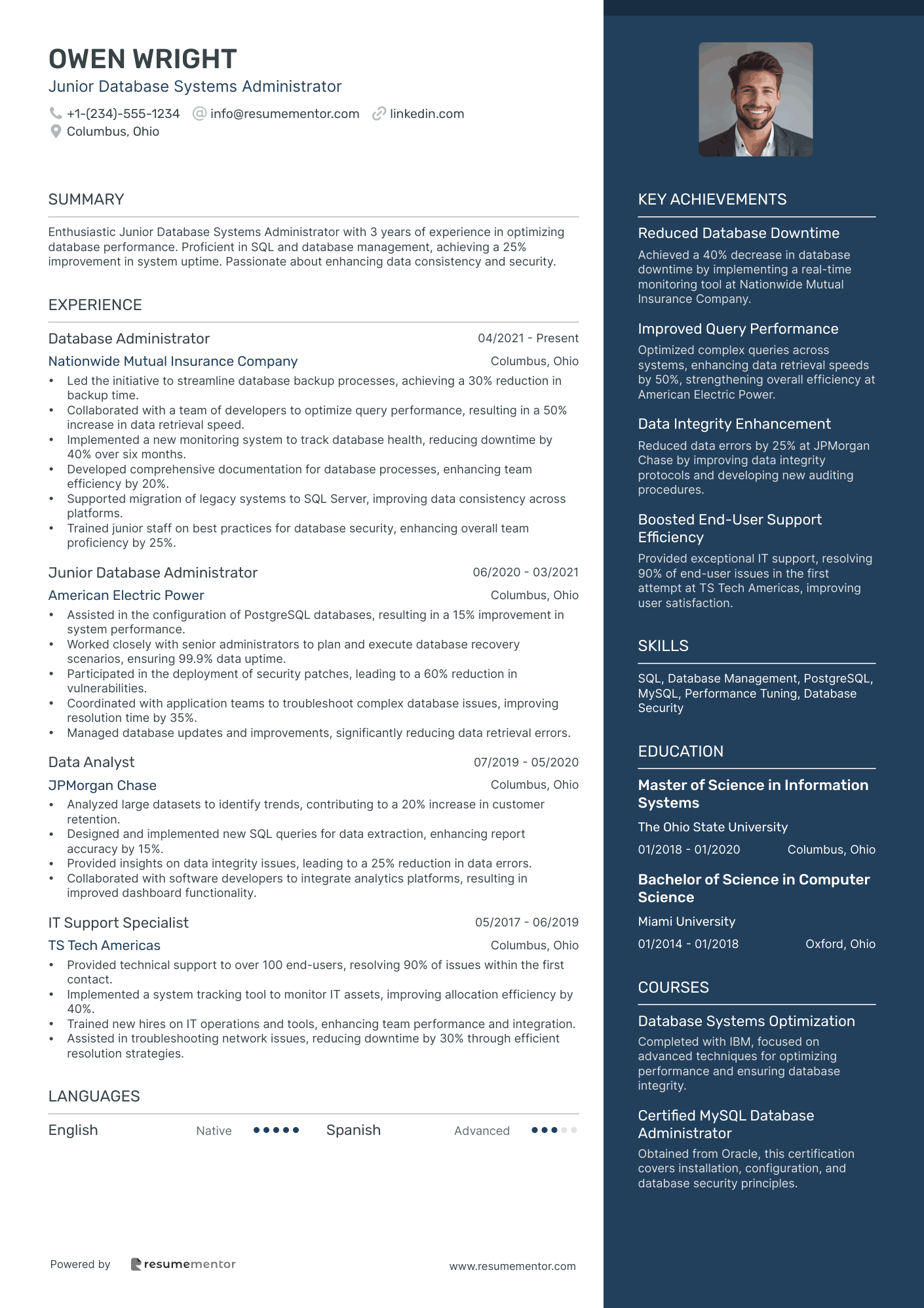
Junior Database Systems Administrator
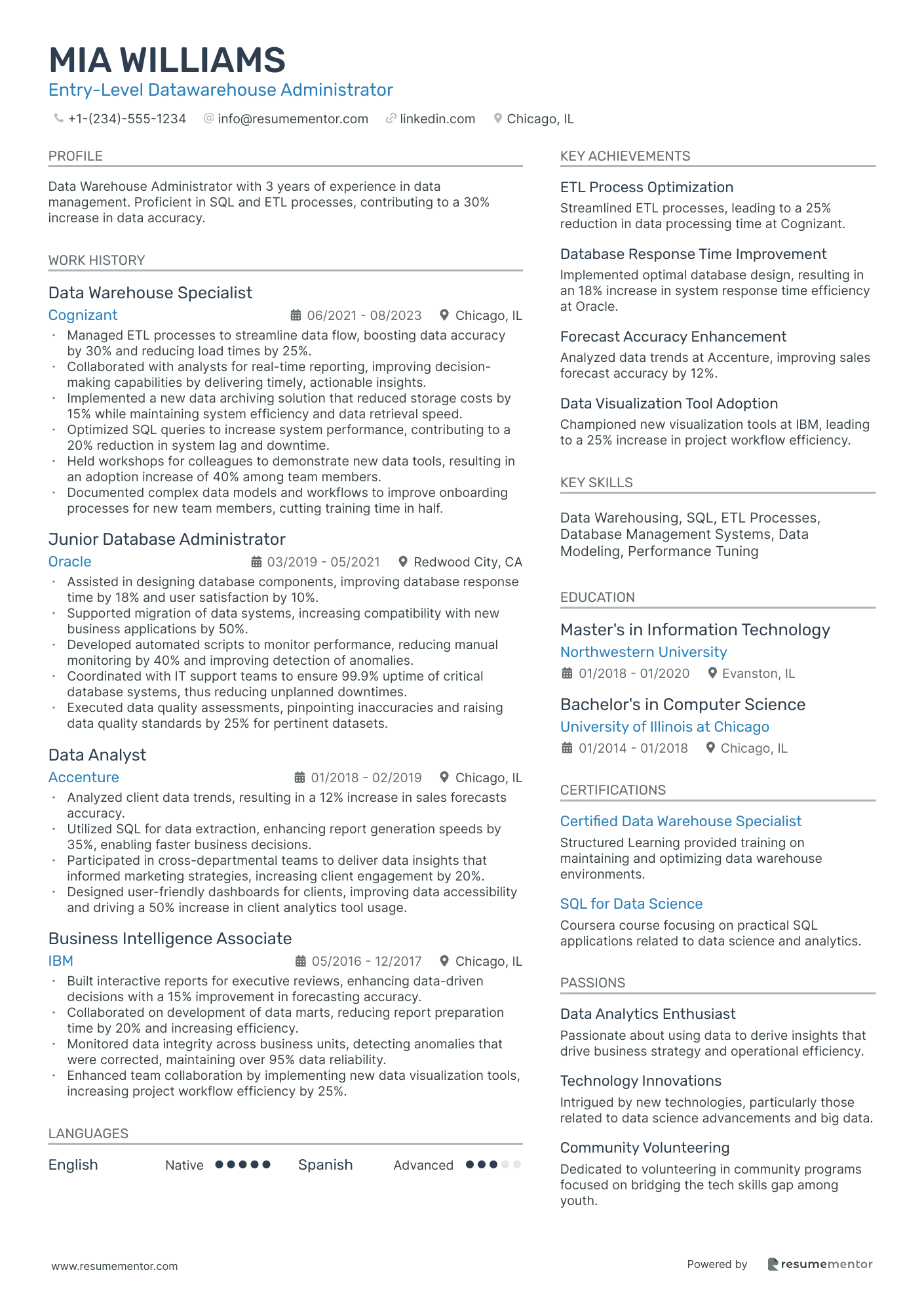
Entry-Level Datawarehouse Administrator
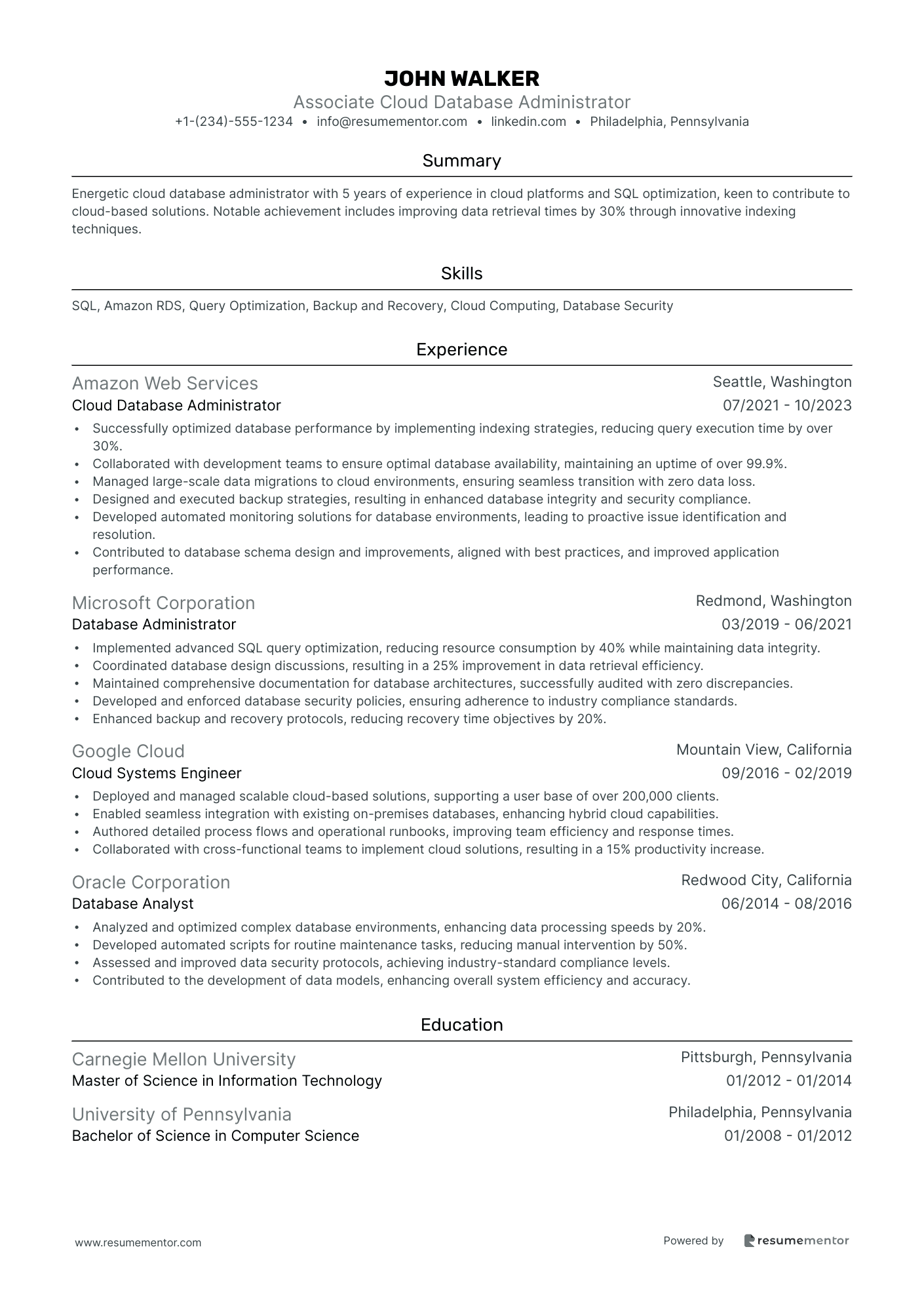
Associate Cloud Database Administrator
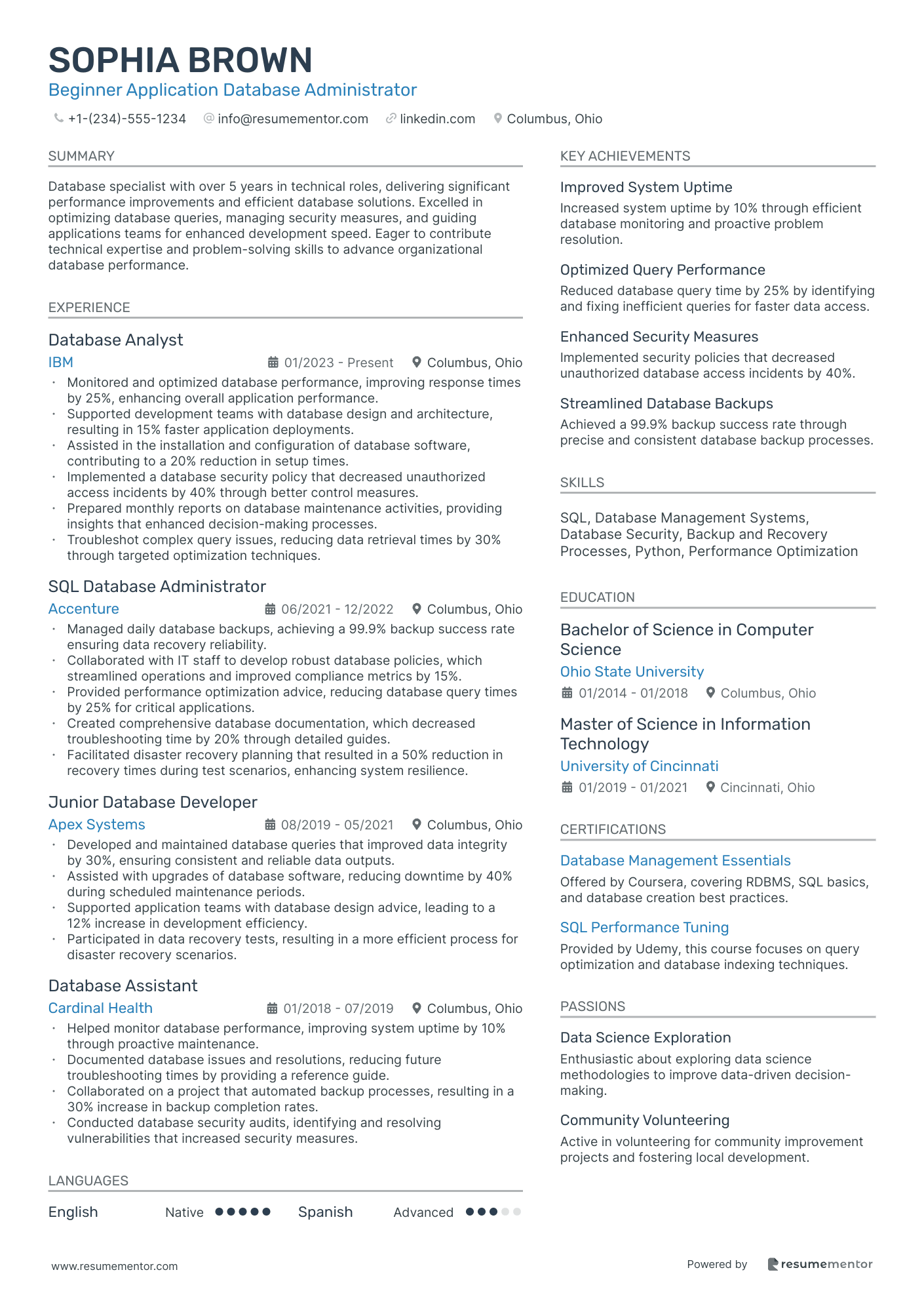
Beginner Application Database Administrator
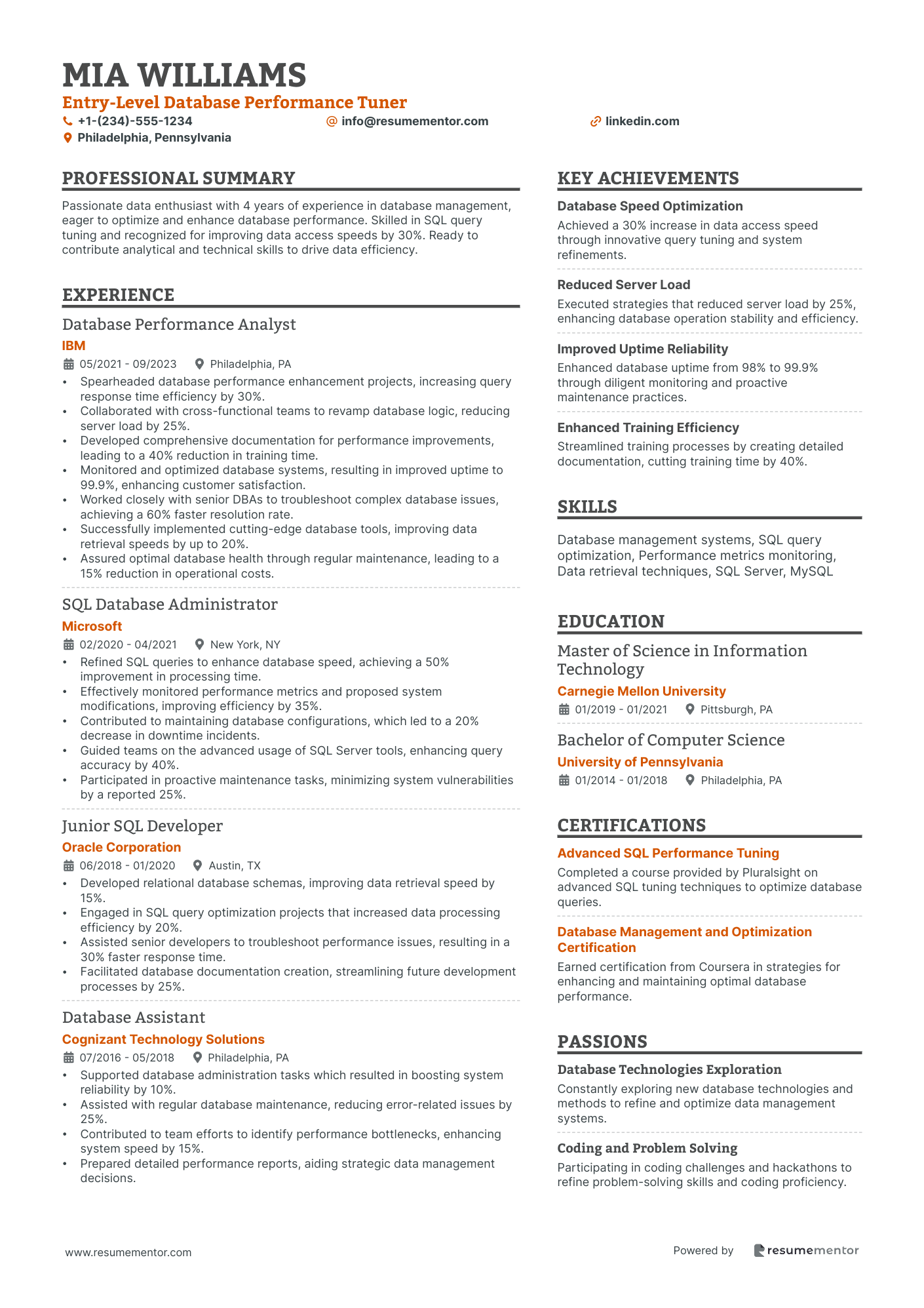
Entry-Level Database Performance Tuner
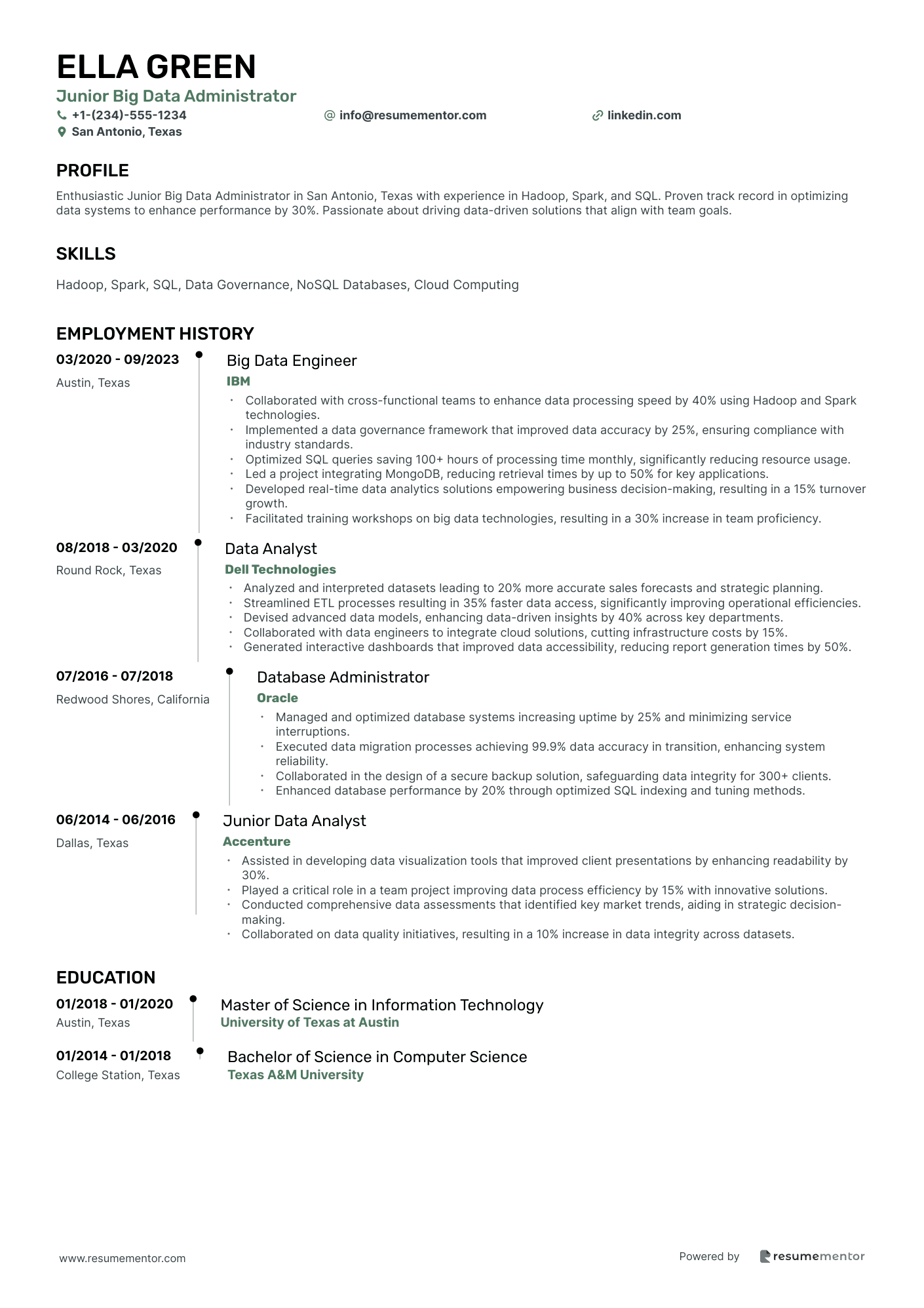
Junior Big Data Administrator

Junior Oracle Database Administrator resume sample
- •Managed installation and configuration of Oracle DB systems, increasing system reliability by 30%.
- •Optimized SQL queries for performance, reducing query execution time by 15% across the board.
- •Established monitored alerts that reduced incident response times by 25%, improving operational efficiency.
- •Implemented robust security measures resulting in a 40% decrease in unauthorized access incidents.
- •Documented database processes and standards, streamlining procedures for junior team members.
- •Collaborated with cross-functional teams to integrate new technologies and improve database migration processes.
- •Conducted regular data recovery tests resulting in a 99% success rate during disaster recovery drills.
- •Automated routine backup processes, resulting in a 20% reduction in workload and error rates.
- •Troubleshot database performance issues, decreasing downtime by 30% through proactive monitoring.
- •Drafted comprehensive documentation for database management that was adopted company-wide.
- •Assisted senior DBAs in database upgrades resulting in seamless transitions with zero customer impact.
- •Supported database migration projects, ensuring data integrity and minimizing errors to below 1%.
- •Improved data backup frequency, leading to a 10% enhancement in overall system reliability.
- •Implemented database normalization practices, optimizing storage and reducing data redundancy by 20%.
- •Assessed current data models and provided recommendations that improved data retrieval speed by 18%.
- •Developed backend systems using PL/SQL, resulting in a 25% increase in application processing speed.
- •Collaborated with teams to design and implement database queries, enhancing data accessibility by 30%.
- •Assisted in the development of internal tools, resulting in a 40% reduction in manual processing time.
- •Provided technical support and troubleshooting that improved resolution times by 20%.
Entry-Level SQL Database Administrator resume sample
- •Improved database query performance by 25% through optimization strategies, resulting in faster data retrieval.
- •Conducted database performance assessments that led to a 30% reduction in processing time.
- •Manage and automate database maintenance tasks, achieving 99.9% database uptime.
- •Successfully integrated cloud database solutions which reduced operational costs by 15%.
- •Collaborated with development teams to support application deployment, enhancing user experience.
- •Led a project that implemented robust security protocols, increasing data protection measures significantly.
- •Assisted in the deployment of SQL Server installations, improving system installation time by 20%.
- •Managed database backup and recovery processes, ensuring 100% compliance with disaster recovery standards.
- •Developed SQL queries to support custom reporting needs, enhancing reporting efficiency by 40%.
- •Optimized server configurations that improved system performance and reduced load times by 15%.
- •Engaged in cross-team collaboration to refine data migration processes, leading to seamless project execution.
- •Conducted data analysis for strategic business decisions, delivering insights that led to a 10% revenue increase.
- •Enhanced data quality by refining ETL processes, improving data accuracy by 18%.
- •Monitored SQL server performance, implementing proactive measures that reduced downtime incidents by 25%.
- •Supported small-to-large scale data migration projects, ensuring data integrity and continuity.
- •Collaborated to develop BI solutions achieving a 20% increase in data reporting capability.
- •Utilized SQL Server Management Studio for effective database administration and query development.
- •Designed and managed ETL pipelines to enhance data transformation efficiency by 15%.
- •Analyzed data sets to support strategic initiatives, aiding in decision-making processes.
Beginning MySQL Database Administrator resume sample
- •Implemented optimization techniques to improve database query performance, achieving a 25% reduction in response time.
- •Managed a project to integrate MySQL databases with cloud-based systems, resulting in improved database scalability.
- •Monitored and maintained database security, reducing potential security threats by 30% through regular audits.
- •Worked with cross-functional teams to design and implement new database structures, enhancing data accessibility by 40%.
- •Developed comprehensive documentation of database processes, improving team efficiency and reducing onboarding time by 15%.
- •Led a team project to upgrade MySQL servers, ensuring zero downtime and seamless integration with existing infrastructure.
- •Contributed to database normalization projects, enhancing the efficiency of data retrieval by 20%.
- •Conducted regular database backup and recovery drills, maintaining a 99% success rate in data restoration.
- •Assisted in database monitoring and performance tuning, improving system uptime from 95% to 98%.
- •Collaborated with developers to design optimized database structures supporting new application releases, leading to a 10% reduction in load times.
- •Documented database setup and maintenance procedures, streamlining team communication and improving process consistency.
- •Built and maintained complex SQL queries for data analysis, improving reporting accuracy by 15%.
- •Participated in data governance initiatives, safeguarding data integrity across inter-departmental databases.
- •Optimized database queries to reduce execution times by 20%, significantly improving user experience.
- •Assisted in the migration of database systems to new platforms, reducing downtime risks by implementing robust testing protocols.
- •Assisted in daily database maintenance tasks, ensuring 98% data availability and system reliability.
- •Supported cloud database migration projects, facilitating seamless transitions and integration.
- •Helped develop and enforce user access controls, reducing unauthorized access incidents by 40%.
- •Provided technical support for database-related issues, resolving 95% of the tickets within set SLAs.
Entry-Level Database Security Administrator resume sample
- •Improved database security monitoring systems, reducing identified vulnerabilities by 30%, leading to enhanced protection.
- •Collaborated with cybersecurity teams to implement encryption standards, bolstering data integrity across 5 major platforms.
- •Developed comprehensive security documentation, which decreased audit preparation time by 45%, improving compliance efficiency.
- •Supported incident response processes, successfully mitigating 10 security incidents, ensuring swift database recovery.
- •Retained secure database configurations, resulting in 98% uptime reliability across critical database applications.
- •Conducted monthly database audits, ensuring 100% compliance with internal security protocols and external regulations.
- •Assisted in the development and execution of database security frameworks, with a focus on minimizing risk exposure.
- •Monitored system performance and security metrics, contributing to a 40% reduction in unauthorized access attempts.
- •Partnered with IT teams to maintain secure database environments, enhancing data protection measures by implementing multi-factor authentication methods.
- •Led a small team to conduct security assessments, facilitating a proficient compliance rate of 95% across all database systems.
- •Participated in security incident management, promptly addressing threats and minimizing potential data breaches.
- •Managed and analyzed data flow within internal systems, ensuring data integrity across banking operations.
- •Implemented secure data transfer protocols, reducing data leakage incidents by 25% annually.
- •Collaborated with database administrators to address performance issues, improving data processing speed by 15%.
- •Contributed to the deployment of security policies, enhancing database data protection and user access controls.
- •Assisted in troubleshooting database security vulnerabilities, ensuring all threat reports were addressed promptly.
- •Provided frontline support for database users, resolving issues with a 90% first-contact resolution rate.
- •Guided end-users through best practices of data access, contributing to a substantial reduction in security tickets.
- •Documented technical support processes, reducing resolution times by automating routine queries and responses.
Junior Database Systems Administrator resume sample
- •Led the initiative to streamline database backup processes, achieving a 30% reduction in backup time.
- •Collaborated with a team of developers to optimize query performance, resulting in a 50% increase in data retrieval speed.
- •Implemented a new monitoring system to track database health, reducing downtime by 40% over six months.
- •Developed comprehensive documentation for database processes, enhancing team efficiency by 20%.
- •Supported migration of legacy systems to SQL Server, improving data consistency across platforms.
- •Trained junior staff on best practices for database security, enhancing overall team proficiency by 25%.
- •Assisted in the configuration of PostgreSQL databases, resulting in a 15% improvement in system performance.
- •Worked closely with senior administrators to plan and execute database recovery scenarios, ensuring 99.9% data uptime.
- •Participated in the deployment of security patches, leading to a 60% reduction in vulnerabilities.
- •Coordinated with application teams to troubleshoot complex database issues, improving resolution time by 35%.
- •Managed database updates and improvements, significantly reducing data retrieval errors.
- •Analyzed large datasets to identify trends, contributing to a 20% increase in customer retention.
- •Designed and implemented new SQL queries for data extraction, enhancing report accuracy by 15%.
- •Provided insights on data integrity issues, leading to a 25% reduction in data errors.
- •Collaborated with software developers to integrate analytics platforms, resulting in improved dashboard functionality.
- •Provided technical support to over 100 end-users, resolving 90% of issues within the first contact.
- •Implemented a system tracking tool to monitor IT assets, improving allocation efficiency by 40%.
- •Trained new hires on IT operations and tools, enhancing team performance and integration.
- •Assisted in troubleshooting network issues, reducing downtime by 30% through efficient resolution strategies.
Entry-Level Datawarehouse Administrator resume sample
- •Managed ETL processes to streamline data flow, boosting data accuracy by 30% and reducing load times by 25%.
- •Collaborated with analysts for real-time reporting, improving decision-making capabilities by delivering timely, actionable insights.
- •Implemented a new data archiving solution that reduced storage costs by 15% while maintaining system efficiency and data retrieval speed.
- •Optimized SQL queries to increase system performance, contributing to a 20% reduction in system lag and downtime.
- •Held workshops for colleagues to demonstrate new data tools, resulting in an adoption increase of 40% among team members.
- •Documented complex data models and workflows to improve onboarding processes for new team members, cutting training time in half.
- •Assisted in designing database components, improving database response time by 18% and user satisfaction by 10%.
- •Supported migration of data systems, increasing compatibility with new business applications by 50%.
- •Developed automated scripts to monitor performance, reducing manual monitoring by 40% and improving detection of anomalies.
- •Coordinated with IT support teams to ensure 99.9% uptime of critical database systems, thus reducing unplanned downtimes.
- •Executed data quality assessments, pinpointing inaccuracies and raising data quality standards by 25% for pertinent datasets.
- •Analyzed client data trends, resulting in a 12% increase in sales forecasts accuracy.
- •Utilized SQL for data extraction, enhancing report generation speeds by 35%, enabling faster business decisions.
- •Participated in cross-departmental teams to deliver data insights that informed marketing strategies, increasing client engagement by 20%.
- •Designed user-friendly dashboards for clients, improving data accessibility and driving a 50% increase in client analytics tool usage.
- •Built interactive reports for executive reviews, enhancing data-driven decisions with a 15% improvement in forecasting accuracy.
- •Collaborated on development of data marts, reducing report preparation time by 20% and increasing efficiency.
- •Monitored data integrity across business units, detecting anomalies that were corrected, maintaining over 95% data reliability.
- •Enhanced team collaboration by implementing new data visualization tools, increasing project workflow efficiency by 25%.
Associate Cloud Database Administrator resume sample
- •Successfully optimized database performance by implementing indexing strategies, reducing query execution time by over 30%.
- •Collaborated with development teams to ensure optimal database availability, maintaining an uptime of over 99.9%.
- •Managed large-scale data migrations to cloud environments, ensuring seamless transition with zero data loss.
- •Designed and executed backup strategies, resulting in enhanced database integrity and security compliance.
- •Developed automated monitoring solutions for database environments, leading to proactive issue identification and resolution.
- •Contributed to database schema design and improvements, aligned with best practices, and improved application performance.
- •Implemented advanced SQL query optimization, reducing resource consumption by 40% while maintaining data integrity.
- •Coordinated database design discussions, resulting in a 25% improvement in data retrieval efficiency.
- •Maintained comprehensive documentation for database architectures, successfully audited with zero discrepancies.
- •Developed and enforced database security policies, ensuring adherence to industry compliance standards.
- •Enhanced backup and recovery protocols, reducing recovery time objectives by 20%.
- •Deployed and managed scalable cloud-based solutions, supporting a user base of over 200,000 clients.
- •Enabled seamless integration with existing on-premises databases, enhancing hybrid cloud capabilities.
- •Authored detailed process flows and operational runbooks, improving team efficiency and response times.
- •Collaborated with cross-functional teams to implement cloud solutions, resulting in a 15% productivity increase.
- •Analyzed and optimized complex database environments, enhancing data processing speeds by 20%.
- •Developed automated scripts for routine maintenance tasks, reducing manual intervention by 50%.
- •Assessed and improved data security protocols, achieving industry-standard compliance levels.
- •Contributed to the development of data models, enhancing overall system efficiency and accuracy.
Beginner Application Database Administrator resume sample
- •Monitored and optimized database performance, improving response times by 25%, enhancing overall application performance.
- •Supported development teams with database design and architecture, resulting in 15% faster application deployments.
- •Assisted in the installation and configuration of database software, contributing to a 20% reduction in setup times.
- •Implemented a database security policy that decreased unauthorized access incidents by 40% through better control measures.
- •Prepared monthly reports on database maintenance activities, providing insights that enhanced decision-making processes.
- •Troubleshot complex query issues, reducing data retrieval times by 30% through targeted optimization techniques.
- •Managed daily database backups, achieving a 99.9% backup success rate ensuring data recovery reliability.
- •Collaborated with IT staff to develop robust database policies, which streamlined operations and improved compliance metrics by 15%.
- •Provided performance optimization advice, reducing database query times by 25% for critical applications.
- •Created comprehensive database documentation, which decreased troubleshooting time by 20% through detailed guides.
- •Facilitated disaster recovery planning that resulted in a 50% reduction in recovery times during test scenarios, enhancing system resilience.
- •Developed and maintained database queries that improved data integrity by 30%, ensuring consistent and reliable data outputs.
- •Assisted with upgrades of database software, reducing downtime by 40% during scheduled maintenance periods.
- •Supported application teams with database design advice, leading to a 12% increase in development efficiency.
- •Participated in data recovery tests, resulting in a more efficient process for disaster recovery scenarios.
- •Helped monitor database performance, improving system uptime by 10% through proactive maintenance.
- •Documented database issues and resolutions, reducing future troubleshooting times by providing a reference guide.
- •Collaborated on a project that automated backup processes, resulting in a 30% increase in backup completion rates.
- •Conducted database security audits, identifying and resolving vulnerabilities that increased security measures.
Entry-Level Database Performance Tuner resume sample
- •Spearheaded database performance enhancement projects, increasing query response time efficiency by 30%.
- •Collaborated with cross-functional teams to revamp database logic, reducing server load by 25%.
- •Developed comprehensive documentation for performance improvements, leading to a 40% reduction in training time.
- •Monitored and optimized database systems, resulting in improved uptime to 99.9%, enhancing customer satisfaction.
- •Worked closely with senior DBAs to troubleshoot complex database issues, achieving a 60% faster resolution rate.
- •Successfully implemented cutting-edge database tools, improving data retrieval speeds by up to 20%.
- •Assured optimal database health through regular maintenance, leading to a 15% reduction in operational costs.
- •Refined SQL queries to enhance database speed, achieving a 50% improvement in processing time.
- •Effectively monitored performance metrics and proposed system modifications, improving efficiency by 35%.
- •Contributed to maintaining database configurations, which led to a 20% decrease in downtime incidents.
- •Guided teams on the advanced usage of SQL Server tools, enhancing query accuracy by 40%.
- •Participated in proactive maintenance tasks, minimizing system vulnerabilities by a reported 25%.
- •Developed relational database schemas, improving data retrieval speed by 15%.
- •Engaged in SQL query optimization projects that increased data processing efficiency by 20%.
- •Assisted senior developers to troubleshoot performance issues, resulting in a 30% faster response time.
- •Facilitated database documentation creation, streamlining future development processes by 25%.
- •Supported database administration tasks which resulted in boosting system reliability by 10%.
- •Assisted with regular database maintenance, reducing error-related issues by 25%.
- •Contributed to team efforts to identify performance bottlenecks, enhancing system speed by 15%.
- •Prepared detailed performance reports, aiding strategic data management decisions.
Junior Big Data Administrator resume sample
- •Collaborated with cross-functional teams to enhance data processing speed by 40% using Hadoop and Spark technologies.
- •Implemented a data governance framework that improved data accuracy by 25%, ensuring compliance with industry standards.
- •Optimized SQL queries saving 100+ hours of processing time monthly, significantly reducing resource usage.
- •Led a project integrating MongoDB, reducing retrieval times by up to 50% for key applications.
- •Developed real-time data analytics solutions empowering business decision-making, resulting in a 15% turnover growth.
- •Facilitated training workshops on big data technologies, resulting in a 30% increase in team proficiency.
- •Analyzed and interpreted datasets leading to 20% more accurate sales forecasts and strategic planning.
- •Streamlined ETL processes resulting in 35% faster data access, significantly improving operational efficiencies.
- •Devised advanced data models, enhancing data-driven insights by 40% across key departments.
- •Collaborated with data engineers to integrate cloud solutions, cutting infrastructure costs by 15%.
- •Generated interactive dashboards that improved data accessibility, reducing report generation times by 50%.
- •Managed and optimized database systems increasing uptime by 25% and minimizing service interruptions.
- •Executed data migration processes achieving 99.9% data accuracy in transition, enhancing system reliability.
- •Collaborated in the design of a secure backup solution, safeguarding data integrity for 300+ clients.
- •Enhanced database performance by 20% through optimized SQL indexing and tuning methods.
- •Assisted in developing data visualization tools that improved client presentations by enhancing readability by 30%.
- •Played a critical role in a team project improving data process efficiency by 15% with innovative solutions.
- •Conducted comprehensive data assessments that identified key market trends, aiding in strategic decision-making.
- •Collaborated on data quality initiatives, resulting in a 10% increase in data integrity across datasets.
As an entry-level database administrator, your resume is the key to unlocking new career opportunities and can feel daunting to craft when you're just starting out. It's normal to wonder how to effectively highlight your skills in data management when you have limited professional experience.
In a competitive job market, it's easy to get lost among other candidates, making it essential to stand out by clearly conveying your software knowledge and analytical skills. This is where a well-structured resume becomes invaluable. By organizing your skills and experiences using a resume template, you can speak directly to potential employers with clarity and focus.
A solid template allows you to tailor your experiences and technical knowledge to each job opportunity, giving you an edge. Clearly displaying your understanding of database systems, SQL, and IT fundamentals becomes crucial, as these elements form the strong branches of your career growth.
When crafting your resume, it’s not just about listing skills; it's about aligning them with what employers are seeking. By taking a structured approach, you gain the confidence needed to tell your story effectively, helping you seamlessly enter the job market and embark on a rewarding career journey.
Key Takeaways
- When writing an entry-level resume for a database administrator role, focus on integrating technical skills, educational background, and relevant projects to demonstrate your understanding of database concepts.
- A well-structured resume using a template is crucial for organizing your skills and experiences with clarity, helping you stand out in a competitive job market by clearly conveying your software knowledge and analytical skills.
- Employers value resumes that align skills and projects with the specific requirements of database administrator roles, emphasizing expertise in database systems, SQL, and IT fundamentals.
- Choose a chronological resume format to highlight educational background and relevant training, and use modern fonts for a professional appearance, saving the document in PDF format to maintain layout integrity.
- Including technical certifications, language skills, volunteer work, and hobbies can add depth to your resume and showcase additional qualities that might appeal to potential employers.
What to focus on when writing your entry-level database administrator resume
An entry-level database administrator resume should clearly present your understanding of database concepts and your enthusiasm to advance in this field. It should seamlessly integrate technical skills, educational background, and relevant projects that demonstrate your capabilities. Ensure each section aligns with a database administrator's duties while incorporating industry-specific terms.
How to structure your entry-level database administrator resume
- Contact Information: Begin with your name, phone number, email, and LinkedIn profile—this section is straightforward but critical. Recruiters need your contact details immediately accessible so they can reach out for opportunities. Consider using a professional email address and make sure your LinkedIn profile is up-to-date and reflects your experience and skills.
- Objective or Summary Statement: Follow with a brief introduction that highlights your passion for database administration—this sets a welcoming and focused tone for your resume. Emphasize why you are drawn to this field and mention key skills like SQL and data modeling that you aim to bring to potential employers. This section should intrigue the hiring manager enough to want to learn more about your background and experiences.
- Education: Next, detail your degree(s) and major(s), focusing on coursework related to database administration. This allows you to demonstrate your educational foundation and preparedness for the role. Including a GPA, if it's strong, or any honors showcases your academic achievements and dedication, offering a snapshot of your commitment to learning and excellence in your field.
- Technical Skills: Build on your educational background by listing your expertise in databases such as MySQL, Oracle, or SQL Server—articulate your familiarity with these essential tools. Additionally, highlight programming languages or tools like Python or R that complement your database knowledge. Demonstrating a broad array of technical abilities cements your understanding of the core technologies used in database administration.
- Projects: Complement your technical skills with descriptions of academic or personal projects involving databases—this is where you can demonstrate applied knowledge. Discuss your role in projects, using specific terms like database design or data migration, and explain how these experiences have prepared you for real-world challenges.
- Experience: Finally, include work experiences like internships or part-time jobs where you actively applied your database skills—detail how these roles shaped your professional development. Focus on the impact you made by outlining accomplishments and responsibilities, using quantifiable results to reinforce your contributions.
As you prepare your resume, remember that effective formatting can enhance readability and make a positive impression. Below, we'll cover each section more in-depth to optimize your resume’s impact.
Which resume format to choose
Designing your entry-level database administrator resume involves picking the perfect format to spotlight your technical skills and education. The chronological format is ideal because it showcases your educational background and any related training or internships. This format makes it simple for hiring managers to follow your growth and potential in the field.
Choosing the right font is also crucial for making a positive impression. Modern fonts like Lato, Montserrat, or Raleway not only look professional but also provide clarity, which is important for technical positions like database administration. These fonts make your resume look contemporary and ensure that all your details are easy to read.
When it comes to saving your resume, always use a PDF format. This guarantees that your layout, fonts, and overall design remain intact across different devices and software, thus preserving the professionalism of your presentation. A consistent appearance is important to convey reliability and attention to detail, traits vital for a database administrator.
Additionally, pay attention to your resume's layout by setting margins to about one inch on all sides. This creates a well-organized and visually pleasing document that provides enough white space for readability. A balanced layout helps keep the focus on your qualifications and accomplishments without overwhelming the reader.
By thoughtfully integrating these aspects, your resume will effectively highlight your skills and qualifications in database administration, leaving a strong and professional impression on potential employers.
How to write a quantifiable resume experience section
Your resume's experience section plays a vital role in showcasing work history that aligns with the entry-level database administrator role. To make a strong impression, emphasize skills and achievements that directly match the job description. Start by listing your work in reverse chronological order, beginning with the most recent positions. Aim to cover the last 5-10 years, focusing on roles that highlight relevant experience, such as “Database Assistant” or “IT Intern.” Tailoring your resume is essential—use the same language and keywords found in the job posting to make your application stand out. Strong action words like "implemented," "optimized," "analyzed," and "coordinated" are effective in highlighting your accomplishments. When you include quantifiable results, you clearly demonstrate the real-world impact you've made.
- •Optimized database queries, reducing data retrieval time by 30%.
- •Coordinated with developers to ensure seamless database integration, boosting efficiency by 20%.
- •Implemented data backup strategies, improving data recovery processes to less than 2 hours.
- •Analyzed and resolved database inconsistencies, enhancing data integrity by 25%.
This experience section effectively ties your achievements and responsibilities into a cohesive narrative. By quantifying your impact, such as reducing data retrieval time, you provide clear evidence of your capabilities. The use of dynamic action verbs like "optimized" and "implemented" not only shows you are proactive but also results-focused. Tailoring your resume to echo the language used in job ads ensures your application feels relevant and targeted, increasing your chances of landing an interview. With specific metrics highlighting your skills, your resume presents you as a capable candidate ready to tackle the challenges of an entry-level database administrator role, making your application both compelling and competitive.
Leadership-Focused resume experience section
A leadership-focused entry-level database administrator resume experience section should emphasize your ability to take initiative and manage projects, even if you don't hold an official leadership role. Highlight moments where you stepped up, communicated effectively, and collaborated with your team to support database management tasks, which shows your capacity to guide and influence others—an essential trait for leadership. Include examples of how you supported and coached colleagues or played a pivotal role in a project's success through active communication and teamwork.
To make your experience truly stand out, focus on the results and the impact you achieved. Explain how your efforts enhanced processes, boosted team productivity, or ensured the timely completion of project milestones. Use strong, active language and provide quantifiable achievements whenever possible to demonstrate your skills effectively. Remember that even small leadership roles or related volunteer activities are valuable, as they add depth to the story of your leadership abilities.
Junior Database Administrator
XYZ Tech Solutions
Jan 2021 - Jul 2023
- Coordinated a team of 5 junior staff to optimize database queries, reducing data retrieval times by 20%.
- Led training sessions to introduce new team members to database management tools, improving overall team competency.
- Oversaw daily database operations while communicating with cross-functional teams to enhance data integrity.
- Initiated and facilitated weekly team meetings to discuss progress, address challenges, and plan future improvements.
Responsibility-Focused resume experience section
A responsibility-focused entry-level database administrator resume experience section should effectively showcase your relevant skills and accomplishments in a cohesive manner. Begin by pinpointing tasks from past roles that align closely with the duties of a database administrator, such as data entry, database upkeep, and software management. By clearly articulating how these responsibilities led to improvements in data accuracy and operational efficiency, you provide a compelling narrative of your contributions. Use active language to describe your responsibilities, and wherever possible, include numbers to highlight the impact of your work.
To further enhance your application, emphasize your problem-solving abilities through examples where you identified or resolved data issues, demonstrating your technical expertise and proactive approach. Each bullet point should be both concise and informative, effectively linking your past achievements to your potential success as a database administrator. This coherence in connecting your experiences to the desired role not only strengthens your profile but also presents you as a well-qualified entry-level candidate.
IT Support Specialist
Tech Solutions Inc.
June 2021 - August 2023
- Improved data reliability by 15% by auditing database records and ensuring accuracy.
- Enhanced system performance through routine database maintenance, reducing downtime.
- Contributed to a seamless migration of database systems, minimizing the risk of data loss.
- Created user manuals for database software, boosting user understanding and reducing support inquiries by 20%.
Innovation-Focused resume experience section
An innovation-focused entry-level database administrator resume experience section should clearly illustrate your ability to introduce and utilize new ideas and technologies. Start by detailing any relevant experiences like internships, projects, or academic work, focusing on where you’ve applied creative solutions and advanced tools. Even without formal work experience, you can emphasize personal projects or coursework that highlight your innovative skills, demonstrating how you think creatively to tackle challenges.
Use specific examples to show where you’ve made improvements, solved problems, or brought fresh ideas to the table. By using action verbs, you effectively convey your contributions. Aim for descriptions that are concise yet detailed enough to make your achievements credible and impressive. Your goal is to show you're not only following conventional paths but also eager to explore new directions that add value to your role and organization. Here’s how you can present your experience:
Database Administrator Intern
Tech Solutions Inc.
June 2022 - August 2022
- Redesigned database schema to improve data retrieval times by 20%, enhancing overall system efficiency.
- Developed automated scripts to streamline data cleaning processes, reducing manual efforts by 30%.
- Collaborated with a team to implement a new reporting tool, leading to more informed business decisions.
- Conceived an innovative method for data backup, ensuring enhanced data security and reliability.
Problem-Solving Focused resume experience section
A problem-solving-focused entry-level database administrator resume experience section should clearly demonstrate your ability to identify and tackle database challenges. Reflect on moments when you handled database issues, streamlined processes, or enhanced overall efficiency. These examples show your skill in analyzing problems and developing solutions, which are key for any database administrator role.
When crafting your resume, detail your responsibilities, the hurdles you overcame, your approach to solving these problems, and the successful outcomes. Use bullet points to communicate these achievements in a clear and concise manner. Each point should illustrate a specific aspect of your problem-solving skills, highlighting the positive impact your actions had on the organization.
Junior Database Administrator
Tech Solutions Inc.
June 2021 - August 2022
- Resolved data inconsistencies with automated scripts, reducing manual errors by 30%.
- Streamlined database access procedures, boosting retrieval speed by 15%.
- Improved backup processes with a new protocol, cutting downtime by 20%.
- Partnered with the development team to solve server load issues, enhancing performance stability.
Write your entry-level database administrator resume summary section
A skills-focused entry-level database administrator resume summary should effectively capture your enthusiasm, relevant skills, and any experience you have. Acting as your elevator pitch, the summary is your chance to grab the hiring manager’s attention right away. It should showcase your strengths in query writing, database maintenance, and familiarity with popular database software, tailoring all this to fit the specific job you’re applying for. Here's a compelling example:
This example ties together your technical skills and eagerness to make a meaningful impact at the company. By highlighting specific achievements like maintaining data accuracy, it emphasizes your competence in real-world applications. As you describe yourself in the summary, strike a balance between confidence and openness to learning. Highlight accomplishments while showing you’re ready to grow. This approach ensures you come across as capable yet eager to develop further. Unlike other sections—such as objectives, profiles, or a summary of qualifications—the resume summary centers on creating a cohesive picture of you as a strong candidate. A resume objective usually talks about your career goals, useful in entry-level roles. A profile is broader, while a summary of qualifications lists achievements and skills. Despite these differences, the summary serves as the backbone of your candidacy by showcasing you as an ideal fit for the role.
Listing your entry-level database administrator skills on your resume
A skills-focused entry-level database administrator resume should effectively highlight both your technical and personal attributes. Start by creating a skills section or integrating your skills into your experience and summary. This approach allows employers to quickly identify your qualifications. Emphasize your strengths and soft skills to reveal personal traits and your ability to collaborate with others. These complement your hard skills, which are your technical abilities like proficiency in SQL or database management. Including both sets of skills also acts as keywords, enhancing your resume's reach during the initial screenings by Applicant Tracking Systems (ATS) and attracting hiring managers. Here's an example structure for a skills section on your resume:
This example is effective because it lists specific and relevant skills essential for a database administrator role. It provides a clear picture of what you can offer, with each skill being measurable or demonstrable in a tech-centered job. Specificity ensures your resume remains focused, making it easy for employers to find the key terms they value.
Best hard skills to feature on your entry-level database administrator resume
For an entry-level database administrator, your hard skills underscore your technical proficiency. These skills communicate your ability to manage databases efficiently and support your organization's demands. Consider emphasizing the following hard skills:
Hard Skills
- SQL
- MySQL
- Database Design
- Data Analysis
- Database Security
- Backup and Recovery
- Performance Tuning
- Data Warehousing
- ETL (Extract, Transform, Load) Processes
- Database Management Systems (DBMS)
- Oracle
- Microsoft SQL Server
- PL/SQL Programming
- NoSQL Databases
- Data Modeling
Best soft skills to feature on your entry-level database administrator resume
Your soft skills showcase your personal traits and how you relate to others in a work setting. These skills prove your ability to collaborate and communicate within teams, enhancing your technical skills and demonstrating adaptability. Key soft skills include:
Soft Skills
- Problem Solving
- Attention to Detail
- Communication
- Teamwork
- Time Management
- Adaptability
- Critical Thinking
- Organization
- Patience
- Multitasking
- Initiative
- Dependability
- Customer Service
- Creativity
- Interpersonal Skills
How to include your education on your resume
Crafting a compelling education section for your entry-level database administrator resume is vital. It provides recruiters with insights into your formal training and knowledge. Tailor this section specifically for the job you are applying for, including only relevant education. Avoid listing unrelated degrees. If your GPA is noteworthy, say 3.5 or higher, it's worth including this detail. Use the phrase "GPA:
on a
scale" to format it clearly. If you've graduated with honors, such as cum laude, add it right after the degree like this: "Bachelor of Science in Computer Science, cum laude." List your degree by stating your major, followed by the degree level.
Here is an incorrect example where the education section is poorly structured, irrelevant to the role, and lacks pertinent details:
[here was the JSON object 3]
Now, a polished and fitting education section example for an entry-level database administrator resume:
[here was the JSON object 4]
This example excels as it aligns with the job requirements. It effectively highlights your relevant degree, honors, and a strong GPA, demonstrating academic excellence in a field pertinent to database administration. The correct labels ensure clarity, making it straightforward for a recruiter to capture vital aspects quickly.
How to include entry-level database administrator certificates on your resume
Including a certificates section in your entry-level database administrator resume is crucial. Certificates demonstrate your dedication to learning and your acquired skills, which can set you apart from other candidates. Begin by listing the name of the certificate to clearly state what you have accomplished. Include the date of completion to show the timeframe of your achievements. Add the issuing organization to provide credibility and context. This information is vital as it can showcase your commitment to keeping current with technological advances. Consider including your certificates right in the header if you have highly relevant prerequisites, like "Microsoft Certified: Azure Database Administrator Associate."
Here is an example of how a good standalone certificates section should appear:
This example is effective because it contains certifications directly related to database administration, reflecting relevant expertise. Each certificate includes its issuer, adding credibility and validating your skills for potential employers. Listing certificates in this manner also makes it easy for hiring managers to quickly identify your qualifications. Keeping this section clear and direct strengthens your resume and helps communicate your readiness for the job.
Extra sections to include on your entry-level database administrator resume
Creating a compelling resume as an entry-level database administrator is crucial in showcasing your skills and potential to employers. Beyond the conventional sections, adding unique elements can differentiate you from other candidates.
Language section — Highlight your language skills to demonstrate your ability to work in diverse environments and communicate with multicultural teams. List any additional languages you speak and your proficiency level, as this can be a valuable asset in various roles.
Hobbies and interests section — Include hobbies to give insight into your personality and help potential employers connect with you. Choose interests that showcase qualities such as attention to detail, problem-solving, or team collaboration.
Volunteer work section — Share your volunteer experiences to demonstrate your willingness to contribute beyond your immediate interests and your ability to work in a team setting. This also highlights soft skills like leadership, adaptability, and commitment.
Books section — Mention books you have read to showcase your willingness to learn and stay informed in your field. This can portray a continuous desire for professional development and self-improvement.
In Conclusion
In conclusion, crafting a standout entry-level database administrator resume involves careful consideration of several essential elements. Your resume is more than just a document; it is your ticket to career opportunities, making it important to create one that effectively showcases your skills and potential. Start by using a well-structured template to organize your information in a clear, concise manner. Highlight your technical knowledge by focusing on SQL, database systems, and IT fundamentals, which are critical components of a database administrator’s role. Remember to align your skills with the specific requirements and language of the job you’re applying for to increase your chances of being noticed.
Pay careful attention to your resume's formatting by opting for a chronological order that emphasizes your educational background and any relevant internships or training. Use readable, modern fonts and save your resume as a PDF to maintain its professional appearance across different platforms. Your experience section should capture any real-world application of your skills, with quantifiable results that underscore your contributions. Incorporate your educational achievements, particularly if they are relevant to the job and demonstrate excellence, such as a notable GPA or honors.
Include a robust skills section that balances both technical and soft skills, highlighting your comprehensive abilities in a relatable way to employers. Consider adding extra sections like languages, volunteer work, or relevant hobbies to provide a fuller picture of who you are and what you can offer. With thoughtful preparation and strategic presentation, your resume will effectively communicate your readiness to take on the challenges of an entry-level database administrator, ultimately helping you navigate your way onto the career path you desire.
Related Articles

Continue Reading
Check more recommended readings to get the job of your dreams.
Resume
Resources
Tools
© 2026. All rights reserved.
Made with love by people who care.

